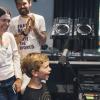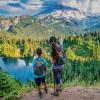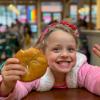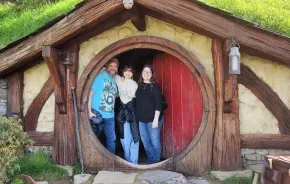Urban wildlife habitat right in our own backyard
The Basics:
Juanita Bay Park is Kirkland's largest park, a 144-acre wetland and
urban wildlife habitat on 3,000 feet of Lake Washington shoreline,
located at 2201 Market St. Rolling landscaped hills dotted with benches
and picnic tables lead to more than a mile of trails and walkways that
allow visitors to venture out over marsh and wetlands. Although it
feels deeply calm, the park is actually alive with water plants and
wildlife that includes beavers and over 100 species of bird.
Interpretive and historical information signs throughout the park
further enrich the experience.
History:
Prior to 1830, a Duwamish winter village that consisted of three tribal
longhouses existed on what would later be named Forbes Creek in the
present-day Juanita Bay Park. Smallpox introduced by fur traders
eliminated these permanent settlements. Survivors returned seasonally
to gather wapato on nearby Juanita Creek until 1916, when the opening
of the Lake Washington Ship Canal lowered the lake nine feet,
destroying the habitat of this important Native American food source.
Real estate developer Guy Farrar purchased most of the land that would
become Juanita Bay Park with money he made during the Alaska gold rush.
Between 1912-1918, Farrar filled the fertile wetlands with sawdust,
cedar bark and dirt and developed the property into a golf course in
the hope of attracting real estate customers. The golf course closed in
1975 and, left alone, the former wetlands began to re-establish
themselves and reclaim the lakefront. The City of Kirkland used the old
golf course, Juanita slough and the 36.5- acre Johnson Preserve to
piece together Juanita Bay Park.
Features:
A kiosk near the parking lot featuring a map and bright photographs of
blue and green herons, redwing blackbirds, painted turtles and beavers
marks the head of the path. Kids with sharp eyes will spot some of
these creatures (and many more) as they explore the park. The East and
West Boardwalk nature trails lead to platforms suspended over the lake.
Damselflies dart above the cattails, turtles scramble for logs amidst
the lily pads and bald eagles skim the lake's surface looking for
supper. Even a few minutes of listening to birdsong and watching the
water will show kids the profusion of wildlife that can thrive when a
lakeshore is allowed to remain undeveloped by humans. A guide to the
park's wildlife, and a plant inventory, can be found at www.ci.kirkland.wa.us/depart/parks/tours.htm.
A long pedestrian causeway bracketed by small interpretive centers
leads across a marsh, shrub wetland and wooded wetland, and past a
beaver pond. Forbes Creek runs along the east side of the causeway,
crossing under it and continuing into Lake Washington near the beaver
pond. Juanita Beach Park, once a popular summer resort that included a
dance hall and large bathhouse, is visible across Juanita Bay. For more
on the history of Juanita Beach Park see www.historylink.org/essays/output.cfm?file_id=4009.
This park is great for all ages and is especially well-suited to
toddler exploration: All of the walkways close to water boast sturdy
railings with spaces wide enough for young children to look (but not
fall) through. And since short flat trails branch off the main pathway,
parents will not find themselves stranded far from the parking lot with
a small, suddenly-worn-out walking partner.
Access:
Juanita Bay Park's wide paved paths make it easily accessible to people
using wheelchairs, strollers or bikes, although bicycles are not
allowed onto the raised wooden walkways extending over the wetlands.
Signage throughout the park is low enough that kids can read it without
a boost. The bathrooms lack changing tables.
Nearby:
Parkplace Center is located two miles south of Juanita Bay Park at the
corner of Central Way and 6th Street, and features many food options.
The Kirkland Branch of the King County Library is located at 308
Kirkland Ave., (425-822-2459), one block from Parkplace Center across
Peter Kirk Park
Paula Becker is a staff historian for www.HistoryLink.org and a mother of three.









